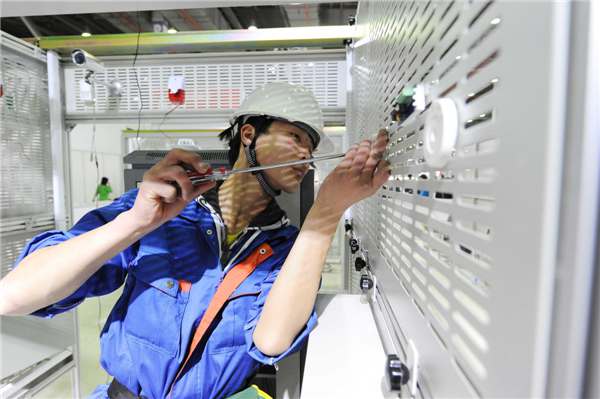 |
| A student fixes a security alarm during the annual competition, in which more than 4,000 students from the city's 72 vocational schools took part. Wang Biao/For China Daily |
"For students of this major, their salary is around 10,000 yuan a month. Once they graduate, they can easily find jobs," Zhou said.
The faster development of vocational education in Taicang has been boosted largely by more than 190 German companies in the city.
Known for its dual education system, Germany's economy has never been derailed, with the vocational education system guaranteeing jobs. A dual education system combines apprenticeships in a company and education at a vocational school in one course.
The dual education system was introduced to China by the central government in the 1980s, with schools under this system set up in cities including Shanghai, Nanjing, Tianjin, Weifang in Shandong province and Shiyan in Hubei province. But these attempts were initially plagued by a lack of proper training centers, the essence of the dual education system, Zhou said.
Local authorities stepped in and by 2007 there were 15 training centers working in collaboration with German companies and vocational schools in Taicang, all of them based in schools.
In July this year, Kern-Liebers, a manufacturer of springs and components for textile machines, based in the German town of Schramberg, set up a 800 square meter training center at its plant in Taicang so that students could be placed in a real-plant environment and learn things more easily.
"We considered all the possibilities to allow the students to grow up in a real-plant environment," Zhou said.
The dual education system can also be found at the Chien-Shiung Institute of Technology in Taicang. Established in 2004, the school received initial investment of 900 million yuan, with an additional 500 million yuan last year to expand its training center sixfold.
All the students under the dual education system are offered jobs by German companies based locally long before graduation.
Wei Xiaofeng, president of the institute, said: "It is now kind of ridiculous to see that migrant workers land jobs easily, while university graduates are left jobless. This is largely a consequence of a structural deficit in the educational system. We see few university graduates mastering the required skills or techniques."
But he said the situation can be changed in places where the economy is developed sufficiently to have an influence on the educational system. In other words, companies can customize the kind of students they need and so change the entire educational system.
"This will do much good for the upgrading and restructuring of the manufacturing industry," he said.
To ensure graduates meet the demands of companies, Chien-Shiung places higher requirements on its teachers. They must have the required teaching qualifications and also be experienced technicians. At present, about one-tenth of Chien-Shiung's teachers have worked overseas.
Of Chien-Shiung's first 17 graduates under the dual education system, half have become technical directors with their companies. Wang Fang, one of them, was promoted from technical worker to workshop director after two years with Schaeffler Holding (China) in Taicang.
"I think graduates from Chien-Shiung are more promising in terms of career development," she said.
Wang Bo graduated from Chien-Shiung last year. Although he received job offers from German companies, he chose to return to his father's firm in Suzhou, which has made electric converters for more than 40 years.


 Storms leave 97 dead, 58 missing in Mexico
Storms leave 97 dead, 58 missing in Mexico New model of indigenous surface-to-air missiles testfired
New model of indigenous surface-to-air missiles testfired  118.28-carat diamond to be auctioned in HK
118.28-carat diamond to be auctioned in HK Maternal love under streetlight
Maternal love under streetlight Naked foreign student sits in the middle of a road in Haikou
Naked foreign student sits in the middle of a road in Haikou  Colorful Yunnan: Enjoy the natural beauty
Colorful Yunnan: Enjoy the natural beauty Harbin named Chinese city with most beautiful women
Harbin named Chinese city with most beautiful women New college students' military training in Guangzhou
New college students' military training in Guangzhou Rugby girls
Rugby girls PLA's 38th Group Army conduct training
PLA's 38th Group Army conduct training Residences of the royal house of Savoy
Residences of the royal house of Savoy The last days of Wan Aihua
The last days of Wan Aihua Highlights at 12th National Games of China
Highlights at 12th National Games of China Beijing Film Academy welcomes freshmen
Beijing Film Academy welcomes freshmen Large mahjong party sets new world record
Large mahjong party sets new world recordDay|Week|Month